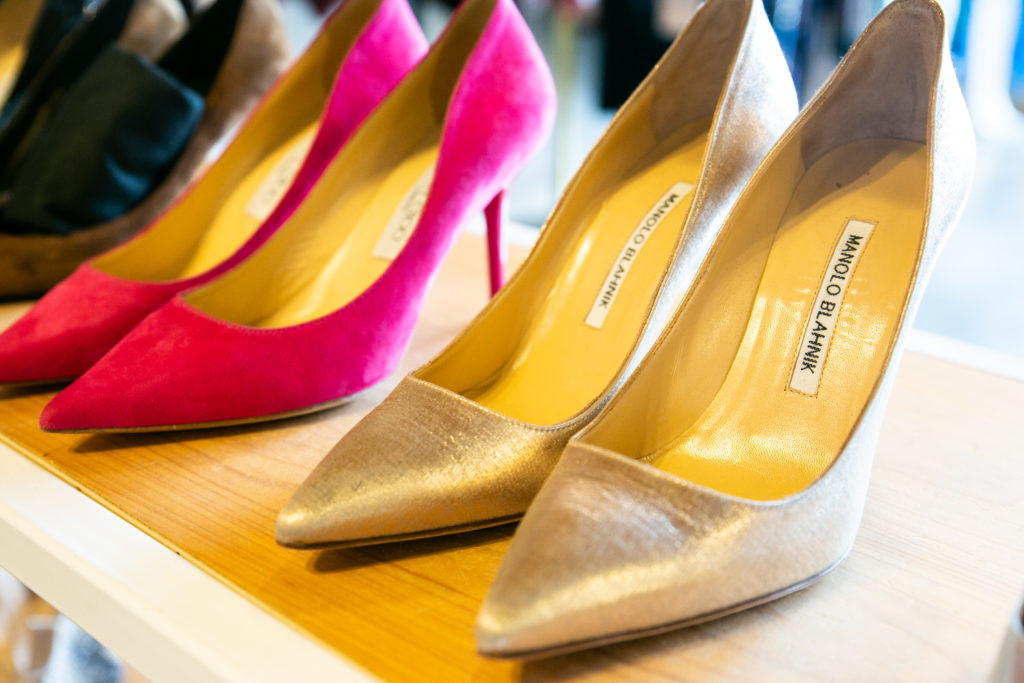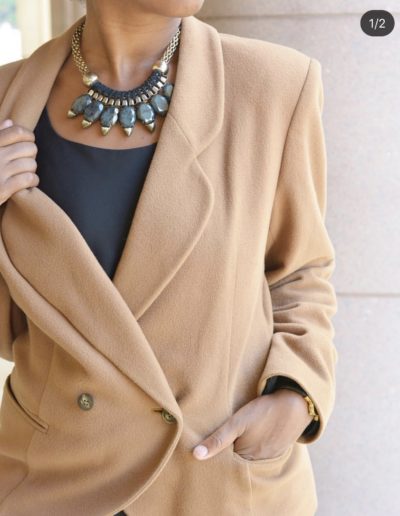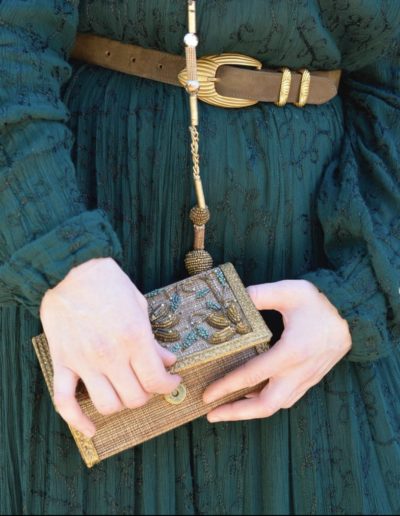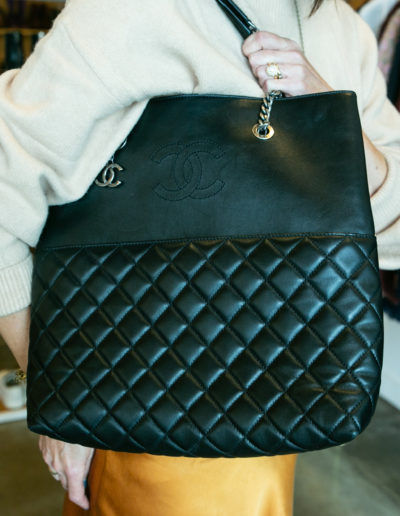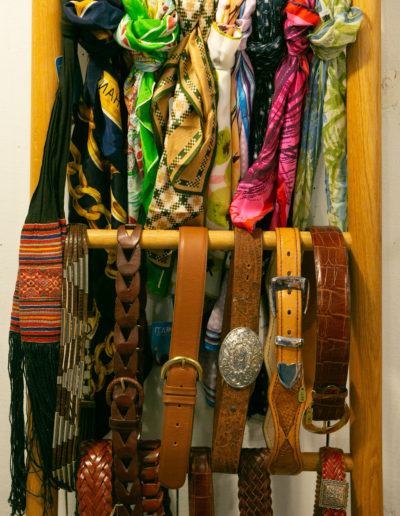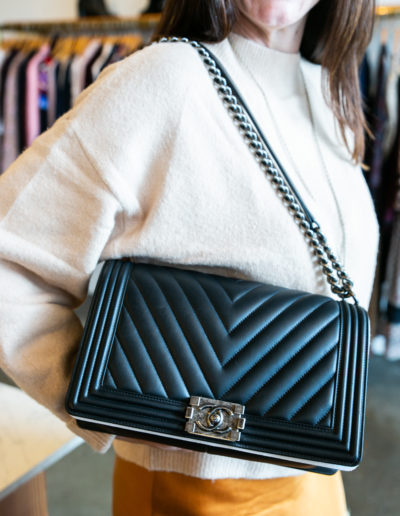I was invited to spill the TEA with The Edit Advisory and Creative Ladies Night on whether or not giving gifts from the secondary market is still taboo.
By now most people are aware of the environmental ills caused by the fashion industry. From outlets like Vogue and Refinery29 to brands like Reformation and even H&M are embracing sustainability.
ICYMI, here are a few of the key facts regarding the fashion industry as we know it:
- Second to oil, the clothing and textile industry is the largest polluter in the world
- Nearly 20% of global wastewater is produced by the fashion industry
- Consumers throw away shoes and clothing [versus recycle], an average of 70 pounds per person, annually
As a decades-long thrifter, I have noticed secondary shopping explode in recent years. Who I see among the racks has also grown. More and more “mainstream” shoppers have left the mall to dig for pre-loved gems in thrift, vintage or consignment stores. But as more and more people are personally shopping for pre-owned fashion, is it still taboo to give gifts that come from the secondary market?
A recent Bloomberg article stated that more than half of Americans are open to getting pre-owned gifts this holiday season, but just what is the current perception when it comes to giving pre-owned gifts?
Jennifer Brown, Luxury Manager for The Real Real attributes the rise in pre-owned shopping due to, “women like me who have been openly and proudly admitting they shop second hand. Sustainability is not such a new thing (think about all the war and depression era ladies who repurposed pretty much everything), now it’s just less of a stigma and more of a badge of honor because we finally realized that apparel manufacturing is incredibly toxic to the planet.” When it comes to gifting pre-owned items, she says, “Some people are afraid of germs and want ‘untouched’ merchandise. As if that is even possible! But the perception is that they received it straight from an assembly line if they order from a brand directly. That is not always the case. E-stores accept returned merchandise all day long and then sell the returned merchandise to the next buyer. How many times have you bought a ‘brand new’ dress in a boutique with a makeup stain tucked away inside?”
Margaret Miner, owner of Rags Consignment with two locations in Colorado and one in Austin still sees hurdles at holiday time where sales of actual items slows down but gift cards increases, “We are closer than we were, but we have a long way to go! I don’t think the general population, even those who are into pre-loved, aren’t yet comfortable choosing used for their holiday gift giving.” In her experience, perceptions against pre-owned gifts include, “something that is second hand may not have that ‘shiny new’ vibe and may have a chance of slight damage that was never noticed before, it may not be particularly ‘on trend’ or that returns may be tricky.” She is optimistic however, “As people become more brand-savvy, or brand-aware, they understand the difference in the quality of higher end items (usually!), and the original cost of the items.”
Dominique Kirven, owner of Thrifted Feels in Austin embraces the giving and receiving of pre-owned gifts. “I think gifting sustainably means you’re redefining the true meaning of gifting. It is about building the gap of mindful shopping versus impulsive shopping and realizing you don’t have the break the bank to have an awesome gift.” Kirven also added, “Plus it’s the thought that counts and who you’re giving the gift too, not so much the gift itself.” She also touched upon the influencer industry and how it is helping to change the perception of pre-owned gifts, “I am inspired by sustainable shopping, even as gifts, and that inspiration grows as I see more and more of my sustainable peers and influencers embrace this trend.”
Eve Michaels, owner of Image Empowerment By Eve Michaels and The Shop Austin Online Boutique relies heavily in vintage for herself and her clients. “Even my wealthiest clients love the “steals and deals” they get when I find them fab vintage, thrift or designer resale jewelry, accessories and clothing,” says Michaels. “Vintage gifts say I care about you, about the environment, and about finding you something unique and special.” In speaking directly to the perception of “used” gifts, she said, “Most vintage jewelry, especially those pieces made from the 1940s through the 1990s were made to a much higher standard of quality than today’s mass-produced pieces. They cost more but continue to go up in value and last. Even today’s Chanel can’t compare to the gold electroplated pieces from the past: where artisan jewelers hand set each stone, used real gold or silver to coat their pieces and the pearls were fine hand poured glass.”
Speaking of which, one thing that everyone agreed upon is that Chanel, in any form, is always acceptable.
When it comes to our own shopping habits and how it fits in with our blog, my partner Jennifer Ransom summed it up best, ”We I love gifts from the secondary market. It’s part of who we are at our core at A Fashionating Life – it’s in our manifesto! We have always viewed fashion as art to be worn and used to express oneself. Much of it is timeless and ageless, so it remains relevant whether it’s new or used. A designer item, which is made with the highest craftsmanship and design aesthetic, is, in our opinion, much more valuable than a new mainstream mass-market item. Personally, I would rather have fewer, high-end pieces, than more items from fast fashion outlets. Finding a fabulous designer piece on the second-hand market is like treasure hunting and I’m always excited to add it to my collection.”
In an age of disposable fashion, it is nice to see the rise of pre-owned retailers continuing to rise in popularity. Shopping on the secondary market allows fashion lovers to save money, fill their closet with unique, one-of-a-kind items, reduce carbon footprint, and even more long-term/more importantly, create change with their dollars. Afterall, 2019 saw everyone from JC Penny’s to Macy’s to Neiman’s invest in pre-loved online fashion retailers and RealReal Inc. had a $300 million IPO. It does, however seem like the jury is still out on purchasing gifts from the secondary market. Raquel Guarino, owner of Nice Girl ATX hopes to see pre-owned gifting grow past the holidays, “I find thrifted gifts are perfect for when there’s no occasion at all. Is a loved one going through a difficult time? A thoughtful gift will show that person you’ve been thinking of them–and that’s what will matter most.”
Photography by http://Breezyritter.com and Thrifted Feels

